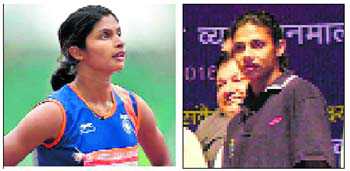
Srabani Nanda and Nirmala Sheoran are training without their coaches ahead of their events at Rio.
Rohit Mahajan
Rio de Janeiro, August 6
“You know, people remember us only once in four years,” says Nirmala Sheoran, the 400m specialist. “That too for a few days. Next month, you people will walk by us, you will not even recognise us.”
Nirmala is right. To use a Punjabi term, after the siapa — the debate and the lament — over India not winning medals at the Olympics gets over, people like Nirmala would be forgotten by everyone, including the media.
Nirmala has some serious issues to deal with. She's been training alone here because her personal coach is not here with her. There is a limit on the number of coaches a nation can send with its team to the Olympics. The Indian Olympic Association (IOA) could not include her coach, Vijender Singh, in the India contingent. What could have been done was that her coach, and personal coaches of other athletes, could have been brought here on IOA's expense and accommodated at an apartment near the Athletes Village. That way, they could have helped their wards.
Help!
So then, without her coach, Nirmala must ask the other coaches of the Indian athletics contingent to give her some time — to time her as she trains and executes trial runs at the track. “Today, they had their off day,” she says at the Athletes Village. “So I also did not go to the practice arena. I just stayed here at the Village, ran around a bit, did some mild training on my own.”
Nirmala has done very well to get to Rio, considering that she's done most of her running on hard dirt tracks. Until around two months ago, she says, she had been training on her own in her village, on a dirt track. That's not how Olympics medallists are made. It was only over the last two months that she moved to Rohtak and trained on a synthetic track.
Nirmala had turned in her personal best of 51.48 seconds in the 400m to qualify for the Rio Olympics. Some thought her sudden improvement was suspicious. The Athletics Federation of Indian president, Adille Sumariwalla, made some uncharitable and unkind comments about her — raising the suspicion that her improvement, her performances in spurts, could be aided by performance-enhancing drugs.
These comments from the top athletics official of India have sort of validated the suspicion against Nirmala. It seems bizarre that an official like Sumariwalla would make such comments against an athlete without a positive dope test against her — it would be much more prudent to privately investigate her coaches and her methods.
Nirmala's life, she says, has been quite tough. She comes from a village in Bhiwani, Chehad Khurd. Her father owns a tract of land that's not big enough to pay for professional athletics training. “The money for my training comes from creditors,” says Nirmala. “My father is in debt. Luckily, now that I've qualified for the Olympics, the Haryana government will pay me Rs 15 lakh, which I will use to repay my father's debts.” That's the story of perhaps any Indian athlete.
Srabani Nanda, the 200m sprinter, has her share of difficulties. She has an extremely supportive parent, her father, who took VRS from his regular job and tried his hand at several things, and now runs a sports club in Odisha. She's benefitted from state funding, and that has paid for her coaching. But she too is without a coach here. The 25-year-old has her first heat on August 15, and she trains without a coach --- she has to request India teammates or other coaches to observe her, time her or point out issues in her running.
Srbani's personal coach, Tarun Saha, too wasn't cleared to become part of the Indian contingent. “If the random coach I ask for help doesn't know much about my training and timing, how can he help me?” she says. “So, on my own, it's not easy for me.”
Even the coach of elite discus thrower Seema Punia isn't here — it's her husband Ankush Punia. He also could not get the accreditation to stay at the Village, and he opted to not come to Rio. “If he had not been able to stay in the Village, it would have been no use for him to come here,” Seema says.
The coaches of sprinter Dutee Chand and long jumper Renjith Maheshwary too weren't cleared to come here officially. However, the Sports Authority of India now plans to send some of the coaches of the above-named players here. It would involve expenses, but medals are won only by countries which provide limitless funding and support to their athletes.



























